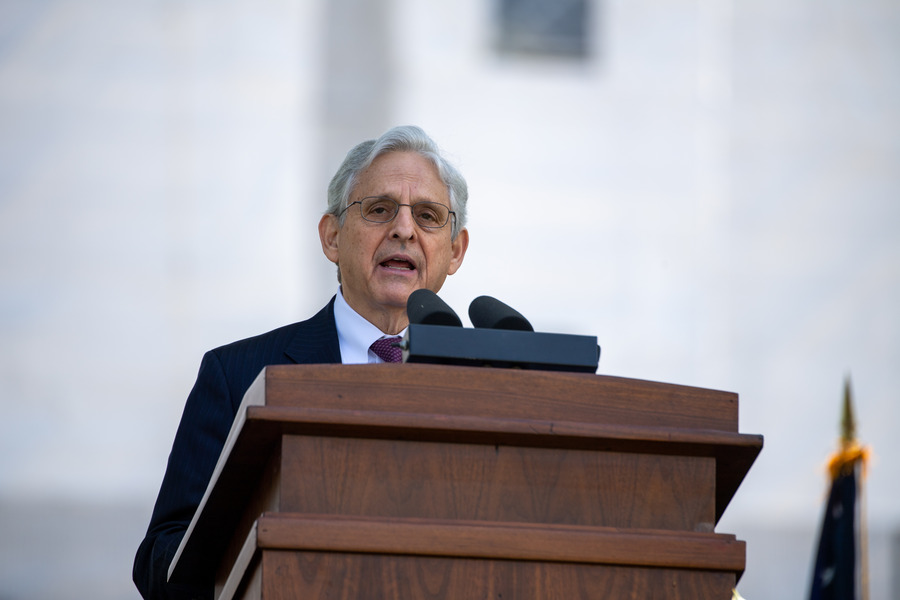Backgrounder: Senators Introduce Bill to Restrict NSC Membership
On Thursday, February 2, Senators Mark Warner (D-VA), Dianne Feinstein (D-CA), Kamala Harris (D-CA), Martin Heinrich (D-NM), Patrick Leahy (D-VT), and Jeff Merkley (D-OR) introduced legislation to restrict National Security Council (NSC) membership and the composition of the National Security Council’s senior decision-making committee.
Published by The Lawfare Institute
in Cooperation With

On Thursday, February 2, Senators Mark Warner (D-VA), Dianne Feinstein (D-CA), Kamala Harris (D-CA), Martin Heinrich (D-NM), Patrick Leahy (D-VT), and Jeff Merkley (D-OR) introduced legislation to restrict National Security Council (NSC) membership and the composition of the National Security Council’s senior decision-making committee. (Representative Stephanie Murphy of Florida has now filed a similar bill in the House that, if passed, would exclude from the NSC any officials “whose ‘primary responsibility is political in nature’”.) This post discusses the impetus for the bill, summarizes its provisions, and identifies several potential separation of powers issues it could come up against.
In a press release, the bill’s sponsors indicated that the motivation for the legislation was President Trump’s decision to include Steve Bannon, Assistant to the President and Chief Strategist, as a “regular attendee” at Principals Committee meetings. As John Bellinger noted, Bannon’s inclusion “is unusual; the NSC function usually does not include participants from the political side of the White House.” As Sen. Warner explained:
Presidents from Truman to Obama have utilized the guidance of the NSC to make tough foreign policy decisions and keep our nation safe from harm. … Respected national security voices in both parties have pointed out that it is unprecedented for the president’s chief political advisor to be made part of a process that should be above politics.
Though it advises the President on exercises of executive power, the NSC was created by Congress in the National Security Act of 1947. However, the Principals Committee, a central player in framing major national security issues for presidential decision, is not actually established by statute. Rather, it was the brainchild of then-National Security Advisor Brent Scowcroft. As Peter Rodman explains in his book Presidential Command:
It was [Scowcroft’s] idea to create what is known as the Principals Committee—an interagency committee of the key cabinet secretaries, chaired by himself, in effect a National Security Council meeting without the president. This would be the forum of last resort for ironing out interagency disagreements or framing those disagreements for presidential decisions.
And the Principals Committee has endured because successive presidents have continued to include it when structuring their national security decision-making apparatus (Trump’s choice of structure as set forth in his presidential memorandum can be viewed here).
The bill, titled Strengthening Oversight of National Security Act of 2017, modifies the requirements for membership on the NSC by amending Section 101 of the National Security Act. First, the bill adds the Director of National Intelligence and the Chairman of the Joint Chiefs of Staff to the group of statutory members: the President, the Vice President, the Secretary of State, the Secretary of Defense, and the Secretary of Energy. Second, the bill limits additional members to only those appointed by the president and confirmed by the Senate. Persons who are not Senate-confirmed may attend NSC meetings (or serve as members) only if their participation is approved by Congress by joint resolution or a bill. This provision excludes the National Security Advisor and Deputies, the Homeland Security Advisor and Deputies, the Chief of Staff, Assistant, and Counsel to the President, the Assistant to the President for Economic Policy, and the Assistant to the Vice President for National Security.
The bill also creates a statutory home for the Principals Committee, which the bill terms the “Interagency Forum for Policy Consideration and Decisionmaking.” Forum members must be NSC members or else Senate-confirmed. Participation by non-Senate-confirmed individuals is restricted to one-time occurrences, which must be reported to Congress within 24 hours.
Under the bill’s provisions, Bannon would generally not be able to attend NSC meetings without prior consent from Congress. Likewise, he could not serve as a member of the NSC or Principals Committee unless the Senate confirms his appointment. He could get away with attending one NSC meeting before these restrictions kick in, if his attendance is promptly reported to Congress. For subsequent meetings, he would require some form of congressional action, through joint resolution, passage of a bill, or Senate confirmation.
These rather stringent requirements face at least two sets of challenges, constitutional and functional.
First, the bill arguably raises serious separation of powers questions. Even putting aside the broadest arguments about whether the bill impermissibly interferes with the President’s ability to conduct foreign affairs, there are open questions here regarding, for example, whether the bill violates the Appointments Clause and what happens if President Trump wishes to exclude or remove a joint resolution-approved member from the NSC.
Second, on a practical note, the proposed requirements are odd in that if (as Peter Rodman himself has suggested) the Principals Committee is itself really more a creature of presidential discretion, then theoretically there is no reason the President couldn’t just create a new, separate committee—a kind of Principals Committee 2.0—with Bannon on it.






